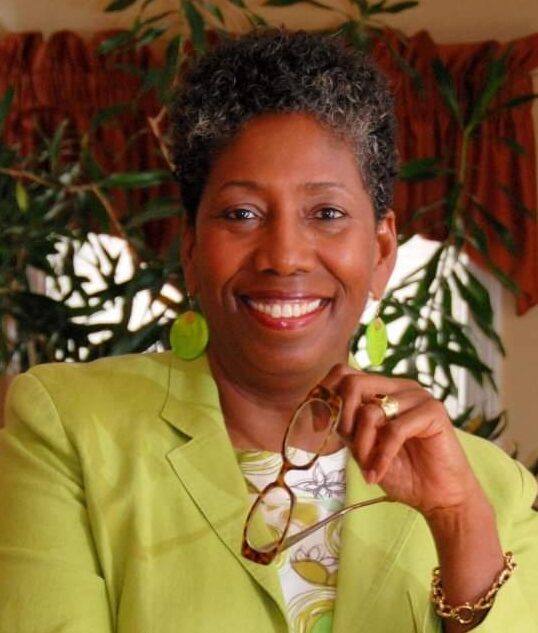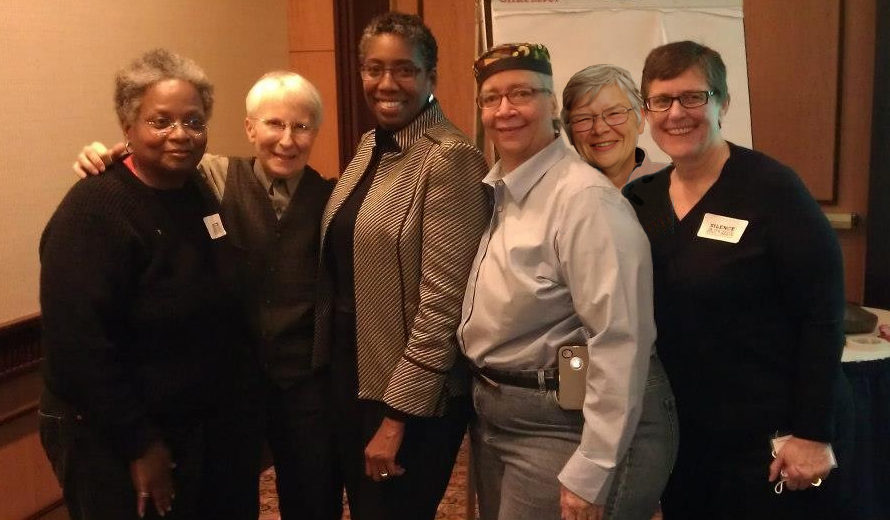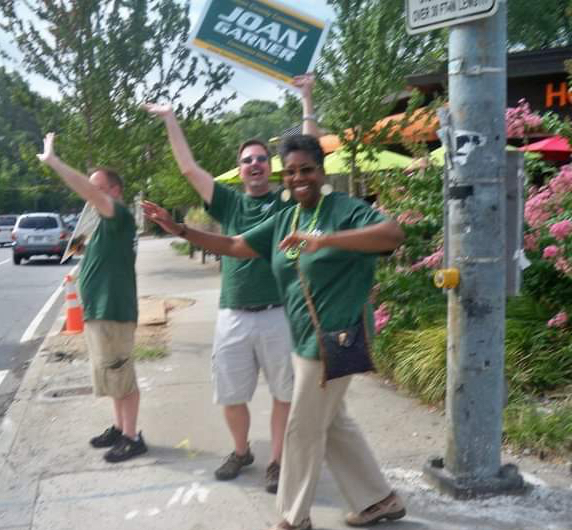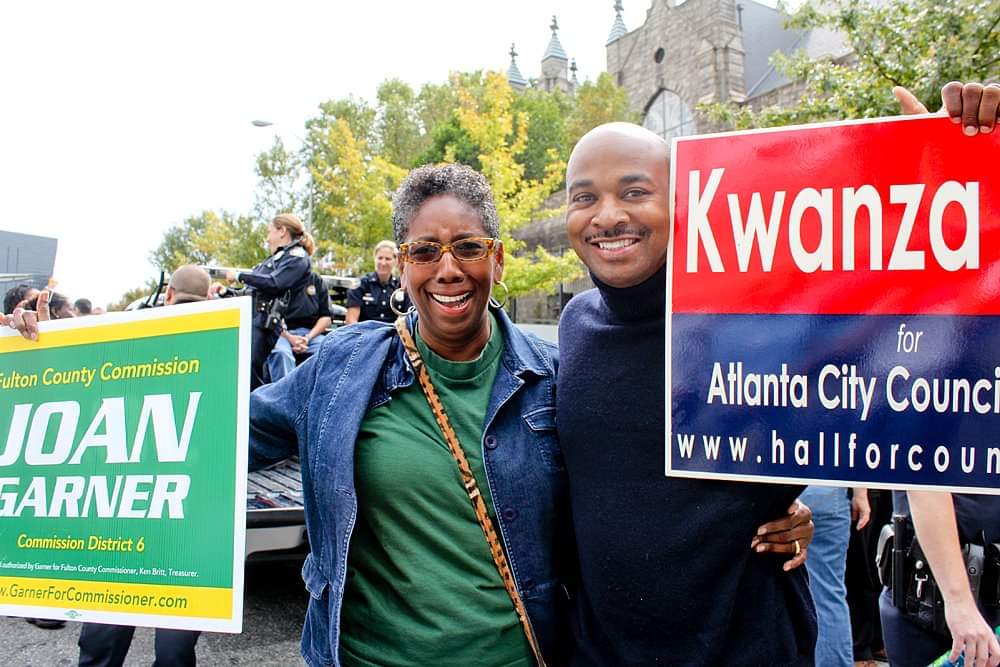Joan P. Garner: Fostering Social Change

Interview by telephone by Rose Norman on April 12, 2013
Rose Norman: What made you a social justice activist? Mandy Carter talked about getting turned on by an American Friends Service Committee speaker in high school. What was your “aha” moment?
Joan Garner: I grew up in Washington, D.C., during the 1950s and 1960s, the height of the civil rights movement. I was in the eleventh grade when Dr. Martin Luther King was assassinated. That event was the aha for me.
That very weekend, I was attending the annual conference of my high school sorority. Girls from several surrounding states were meeting in Washington, D.C., the weekend of April 4, at the Washington Hilton Hotel. Dr. King was assassinated, and a curfew was put on the city. We couldn’t leave the hotel. We were about 150 African American girls, and the rest of the hotel was completely white, except for some of the maids and other service staff. We were petrified about the assassination and the curfew; and we didn’t know what was happening. We could look out of our hotel window and see U Street starting to burn.
Our sponsors decided to go ahead with the conference and to dedicate it to Dr. Martin Luther King, Jr.. They wanted to make sure that we understood the history of Black people the social justice movement that Dr. King led. When I left that weekend, I knew that my life’s purpose was about social justice. I didn’t quite know how I would fulfill that purpose yet. But I knew that what motivated me was working for my people, and working for justice.
It wasn’t until I came out as a lesbian in the early 1980s. I got involved with the lesbian and gay movement in the late 1980s, and I realized here was my opportunity to work for social justice.
As an African American lesbian, I was one of the very few of us at that time willing to work publicly, acknowledge ourselves publicly as being gay while working for the cause. That’s how I became an activist. Of course, justice was always a motivating factor for me in everything I did.
Biographical Note
Joan P. Garner (b. 1951 and d. 2017) was born and raised in Washington, D.C. She lived in Atlanta, Georgia since 1978. She majored in English at the University of the District of Columbia, in Washington, D.C. She earned a master’s degree in organizational communication from Howard University, also in Washington, D.C.
Joan Garner was elected county commissioner for three, successive terms in Georgia’s district 6, the southeast quadrant of Fulton County, Atlanta.
In 1993, Joan was one of six cofounders of Southerners on New Ground (SONG). At that time, Joan was director of the Fund for Southern Communities (1993 to 1997), an organization that fosters social change in Georgia, North Carolina, and South Carolina.
(Read full bio.)
RN: It’s interesting that it was gay rights that got you into activism. Were you in Atlanta, Georgia, then?
JG: Yes, I had come to Atlanta in 1978, and I was married then, and had been for a number of years. I really didn’t understand. I didn’t know anything about the gay movement. I didn’t know there was a lesbian and gay movement.
There was an AIDS epidemic happening. When I came out, having divorced my husband, I got involved with the first Human Rights Campaign (HRC) fund dinner here in Atlanta. Through working on the HRC dinner, I learned about the lesbian and gay movement, and I began to understand what I was doing and why. I knew that I was lesbian, that I had to be out, and that here was another group that was being discriminated against.
For me, growing up in Washington, D.C., if you were gay, that meant you had a mental illness. There were gay people in my family, a cousin and an uncle. Everybody knew it, but… When I came out to my mother, she said, “My best friend growing up was a gay man. We’d go to parties where one side of the house would be for gay people, and the other side would be for straight people. By the end of the night, we were all going back and forth.” And she laughed.
RN: When did feminism come in?
JG: I knew about the women’s movement, of course, and the antiwar movement. I saw all those things happening in Washington, D.C. While I didn’t actively engage in them, they made a mark on me, on how I began to think. It wasn’t until I began working with the Fund for Southern Communities that I realized how much unfinished business there was from the modern civil rights movement. It was through funding social justice that I decided to continue to be active in my community on a number of fronts. One of them the women’s movement, and coming into contact with lesbian feminists. That’s when I met Suzanne Pharr, Jewell Gomez, Mandy Carter, Mab Segrest, and Barbara Smith. They were the ones who taught me feminist theory. And reading Audre Lorde. I realized that these were my beliefs as well.
RN: Was it through the Fund for Southern Communities that you met the other cofounders of Southerners on New Ground (SONG) ?
JG: I did. I started as development director and then was director. That was my introduction to social justice work. I started meeting community activists from around the country as part of the Funding Exchange Network, particularly here in the South. [The Funding Exchange Network was the parent organization for regional funding organizations like the Fund for Southern Communities.]
Here in Atlanta, I got involved politically by working on political campaigns. I worked on former Mayor Jackson’s campaign. [Maynard Jackson, the first Black mayor of Atlanta, served from 1974-1982.] Then, he appointed me as a liaison to the lesbian and gay community in his second administration. That’s how I became politically involved in Atlanta as an African American lesbian. Mayor Jackson appointed me to a number of boards and commissions, and I got involved in my neighborhood work. I live in the community where Martin Luther King grew up.

RN: Tell us your story of how SONG started.
JG: Mandy Carter, Mab Segrest, Suzanne Pharr, and Pam McMichael came to me from that Creating Change conference where they got the idea for SONG. They had all attended the conference; I had not. They came with the idea of a biracial group focusing on the interconnections of race, class, gender, and sexual orientation. They brought the idea to me because of my work with funding, with the Fund for Social Communities. I knew immediately that I wanted to be part of it.
RN: Tell us a little about the Fund for Southern Communities. And how it differs from what SONG does?
The Fund for Southern Communities was part of what used to be called the Funding Exchange Network, headquartered in New York. There were fifteen funds across the United States that had a mission of funding social justice work through advocacy as opposed to service. The Fund for Southern Communities was one of the Southern members, serving North Carolina, South Carolina, and Georgia. It was a public foundation. We raised the money to give away.
What was unique about the concept of funding social justice was to challenge the status quo of power dynamics. Grantees as well as donors served on the governing body to make decisions about where this money would go. The Fund for Southern Communities still exists. However, the parent organization, the Funding Exchange, has recently closed. The Fund for Southern Communities was one of the first to fund work on lesbian and gay issues in the South.
SONG differs from the Fund for Southern Communities in that SONG develops and administers programs. It doesn’t just raise money. SONG did win some grants from the Fund for Southern Communities.
RN: Say more about how feminism came into your social justice activism.

JG: My thinking and actions have always been progressive, and I’ve always considered myself a feminist. I read about feminism in college. I read a lot of Simone de Beauvoir, as well as Audre Lorde and Barbara Smith. Women (and men) who are independent thinkers, and who call themselves “feminist,” I consider feminist. I’ve always seen myself as an independent thinking woman, speaking out for justice. But I never identified with the white feminist movement.
My mother was primarily a single mother. I saw her working, refusing to take welfare, and raising us with some support from my dad (although he wasn’t in the house with us). I saw her, all her life, take care of us, advocate for us, and advocate for herself. She’s my role model of a feminist. Someone who had her own mind, who did what she needed to do, and who did the best that she could. She instilled in us to always have a place to live, a job, a career, and always be able to take care of yourself, not depending on anyone else. That’s where I got my feminist values.
RN: You got your feminism at home when many white women then were getting it from the movement because they weren’t seeing that at home.
JG: Right. The thinking there was that we did not want to marginalize our work. There were so many intersections of it. We brought in Black women and white women; we brought in younger people; we even brought in men at one time. (There are men involved now.) We wanted it clear that there is no hierarchy of oppressions, and that if I go to a negotiating table, I’m going to bring all of my issues with me. Building allies across lines is important. We make our case stronger that way.
We also didn’t want to be pitted against each other. At the time when we were forming SONG, there was a lot of controversy going on around with the gay rights movement being compared to the civil rights movement. Black people did not want to be compared to white, gay men. The gay movement then was primarily seen as white, gay men, which was very different from the civil rights movement. We wanted to break down those barriers and get to the root causes of why there is so much hatred and discrimination.
SONG is unique in its intersectionality, bringing together work on feminism, gay rights,
and antiracism, rather than single, identity issues.
RN: Had you already gotten to that place in your thinking when Mandy Carter and those other women came to you with the idea for SONG?
JG: I had. It clicked for me while I was working with the gay rights movement, going from one meeting to another. As a Black woman, I was taught that we have to present ourselves in a certain way. It’s part of the culture. I realized that I’m a woman, I’m African American, now I’m a lesbian, and I’m still facing the same challenges that I had being one or the other of those. Now I’m a senior. I’m all of those things. I realized early on that I’m one person. I could segment them out, or I could bring them all to the party. My being is political. My total being is political. My personal life is political because of who I am in this society. I came to that before I came to SONG.
I remember sitting on my bed one morning trying to figure out what to wear to a meeting. I was thinking that the mayor has appointed me to this committee to represent the gay and lesbian community, and I have to go to this meeting of the movers and shakers of Atlanta. How do I present myself? And then, I thought, “Why do I have to deal with people telling me how to be?” It was a click. The same things I went through as a woman, now I have to deal with as a lesbian.
SONG put that in an intellectual, activist context. For me, it was a practical thing. Why am I carrying these burdens? Why are people telling me how to exist? I didn’t like that.
RN: Your story of creating SONG is different because you weren’t at Creating Change. Did they come to you in person, or did they call you on the telephone?
JG: I had a phone call telling me that several folks wanted to sit and talk with me. It was Pam McMichael, or it might have been Mab Segrest. I think that all five of them came to Atlanta to ell me about the idea for what became SONG. I said immediately for them to count me in! They had been working in the trenches of this for years. I saw that this was something that the lesbian and gay rights movement needed at the time, and that we could bring the movement forward by showing the connection to other social justice movements and issues.
RN: How did SONG go from being an idea that you all shared to an organization that has now lasted almost 20 years?
JG: We had a number of meetings, moving forward, and we realized that we needed an organization, we needed to incorporate, and hire staff and raise money. We would have retreats periodically. We came up with the name SONG at one of those retreats. I said that we needed a name connected with the South—culture, music, food—a name with a cultural ring to it. And we came up with SONG as an acronym, and then we made up the words to go with the acronym.
We were meeting all over the place then. Pam was in Kentucky; Suzanne was in Arkansas; Mab and Mandy were in North Carolina; and Pat and I were here in Atlanta. I think we met in all of those states at one time or another. We would go to the beach, the mountains, and retreat centers.
RN: Who was the ringleader?
JG: That’s interesting, but there really wasn’t a “ringleader,” per se. We all had a role, and it was a collective role. It was about all of us, our collective wisdom. We knew that we had to designate key people to run the organization. When we got our first grant, Pat Hussain and Pam McMichael became codirectors, working full-time on SONG. We all became founding board members. Pat and Pam organized everything, did the nitty gritty work of making the organization function. Eventually, Mandy took over from Pat, and we began to get funding from a lot of places.
For a long time, we had discussions about opening it up to men. For the first few years, we were adamant about not having men. We felt we had more work to do in establishing it as a feminist organization with a solid foundation. We were getting to know each other, building bonds of trust among ourselves, and making sure the organization wasn’t dependent on just one person or on one personality. Pat was the only one of the cofounders that I knew well because she and I had worked together on lesbian and gay rights. We called ourselves among the few, “out, Black, radical dykes” at the time. I knew Mab and Mandy from the Fund for Southern Communities. And I knew of Suzanne because of her work and her writing. But I didn’t know Pam at all. We were getting to know each other, and we wanted to make sure our dynamics were sustainable before we opened it up to others.

RN: SONG has been going almost 20 years now. It is thriving as far as I can see. What do you think accounts for your surviving past the initial enthusiasm?
JG: When I look at those women, the other cofounders, I was just so in awe of them because of the work they had been doing. This is a serious group of women. I thought I brought some comic relief. [laughing]
My commitment was just as strong, but I didn’t have the activist experience that they had. On an individual level, each of us brought a certain level of commitment to this work. We were very serious about making sure that whatever our vision was of how we want to be in society, we had to demonstrate that in our work. If things got tight, or hard, we took time out to really get through the hard parts, to really understand what was happening to a person, where they were coming from. I think it was the strong commitment that each of us brought to this work. We wanted this to withstand the test of time. If we ran up against issues, we were committed to staying in it, to work through those issues.
RN: The SONG chapter concludes the special issue of Sinister Wisdom because it was founded right at the end of our study period (1968 to 1994). I see SONG as a new beginning. A lot of things had run their course. A lot of revolutionary ideas, such as separatism, had come and gone. SONG was new. You all came to it from different places. For you, why was SONG the right thing at the right time?
JG: There was so much that I saw that was unfinished with the civil rights movement. I wasn’t that engaged with the feminist movement, and there were all of these separate movements. For me, I wanted to know how we make the connection here. For me, it’s personal. A question that comes up a lot for me is, “Are you first a lesbian, or are you first African American?” And I would say, “What do you mean by ‘are you first an African American or first a lesbian?’ I am an African American woman, a lesbian. That’s the total of me. I can’t separate myself.” For me, I felt that what we did could not be business as usual. I would never go into a meeting and say, “I’m here as an African American first, or a lesbian first.” The total of me is in this room, dealing with all of the issues that I have to deal with as a person. For me, starting SONG, I felt that if we’re going to do this. We’ve got to stay in the future, and move this forward, without the separation. We can no longer continue to separate ourselves because there is an unbreakable connection.

NOTE: Joan made such a significant impact as a commissioner that in August 2019, her colleague, Fulton County District 4 Commissioner Natalie Hall, succeeded in getting the Ponce de Leon branch of the public library renamed as The Joan P. Garner Library.
“I believe this is a fitting tribute to my mentor, friend, and boss, the late Commissioner Joan P. Garner,” said Natalie Hall.
The Joan P. Garner library in located in the middle of metropolitan Atlanta. What a fitting tribute to an amazing woman.
See: Commissioner Natalie Hall Renames Public Library to Honor Commissioner Joan P. Garner
This interview has been edited for archiving by the interviewer and interviewee, close to the time of the interview. More recently, it has been edited and updated for this website. Original interviews are archived at the Sallie Bingham Center for Women’s History and Culture in the David M. Rubenstein Rare Book and Manuscript Library at Duke University in Durham, North Carolina.
See also:
Southerners on New Ground – SONG
